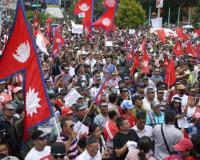- World
- What is the Singapore Strain CM Kejriwal is Worried About?
What is the Singapore Strain CM Kejriwal is Worried About?
Concern was voiced about a new variant in the novel coronavirus’ book of tricks by Delhi CM Arvind Kejriwal as he raised the ominous spectre of a third wave hitting India unless the mutant was kept at bay on the shores of Singapore. Interestingly though, Singapore, too, seems to have similar misgivings and voiced concern
Concern was voiced about a new variant in the novel coronavirus’ book of tricks by Delhi CM Arvind Kejriwal as he raised the ominous spectre of a third wave hitting India unless the mutant was kept at bay on the shores of Singapore. Interestingly though, Singapore, too, seems to have similar misgivings and voiced concern about foreign strains hitting the island nation.
In a tweet in Hindi on Tuesday afternoon, Kejriwal said that a “new strain of corona (sic) that’s emerged in Singapore is said to be extremely dangerous for children, can come as a third wave in India…” The country has seen the emergence of the B.1.617 variant, which has also been referred to as the ‘double mutant’ because it bears two prominent mutations, the E484Q and L452R that have also been seen elsewhere.
सिंगापुर में आया कोरोना का नया रूप बच्चों के लिए बेहद ख़तरनाक बताया जा रहा है, भारत में ये तीसरी लहर के रूप में आ सकता है।केंद्र सरकार से मेरी अपील:1. सिंगापुर के साथ हवाई सेवाएं तत्काल प्रभाव से रद्द हों2. बच्चों के लिए भी वैक्सीन के विकल्पों पर प्राथमिकता के आधार पर काम हो
B.1.617 was first reported in October and, according to the New York Times, is the most common variant in India, where total cases have now crossed 25 million, only the second country after the US to breach that figure.
The same variant has also been found in Britain, the US, and in Israel. The World Health Organisation (WHO) classified B.1.617 as a “variant of global concern” earlier this month, saying that it has been found to spread more easily than other variants and. It added that further studies are need to study its impact on weakening the antibody response to the novel coronavirus. The UN agency added that the variant has already spread to more than 30 countries.
Schools in Singapore are to remain shut from Wednesday after authorities earlier this week flagged what they said were new coronavirus strains like the one first detected in India that had been found to affect more children.
According to reports, in reference to the B.1.617, Singapore health minister Ong Ye Kung told a news conference on Sunday that it “appears to affect children more”. Education Minister Chan Chun Sing is said to have added that it was “an area of concern” although none of the infected children in the city-state were seriously ill.
The first wave of Covid-19 was largely seen as having spared children, but experts fear that the rise of new and ‘smarter’ mutations may enable the novel coronavirus to affect those that may not be normally regarded as being more susceptible to catching an infection.
In fact, in a senior government-level review meeting last month, it was noted that the majority of Covid-19 cases during the second wave in India are being reported among the 15-44 year age group.
Although, including for obvious reasons like territory and population size, not to mention its famously disciplined and efficient society and government, Singapore has managed to keep cases in control, the announcement to shut schools came amid a sharp rise in domestic cases.
Singapore’s tally for May so far is 193 cases. That comes on the back of 55 infections in April and just nine in March. No wonder that the new figure represents a worrisome spike to the island nation of 5.7 million people that has seen a total of 61,000 cases since the start of the pandemic.
AAP leader Kejriwal also called for a ban on flights into India from Singapore and asked that vaccination options for children be explored.
Singapore has already put restrictions on flyers with travel history to India. Effective April 22, the Singapore foreign ministry said that all long-term visit pass holders and short-term visitors with recent travel history, including transit, to India within the last 14 days will not be allowed entry into Singapore, or transit through Singapore. It added that all travellers from India are subject to a 21-day
quarantine at dedicated facility (SDF) along with tests on the 14th and before the end of their 21st day.
According to guidelines effective from the last week of February, international arrivals in India with travel history to UK, Europe and Middle East, must undergo an additional Covid-19 test on arrival. If they test negative for Covid-19, they must self-monitor their health for 14 days. But passengers from Brazil, South Africa, and the UK who test negative must quarantine for seven days at their residence and undergo further testing.
Read all the Latest News, Breaking News and Coronavirus News here











